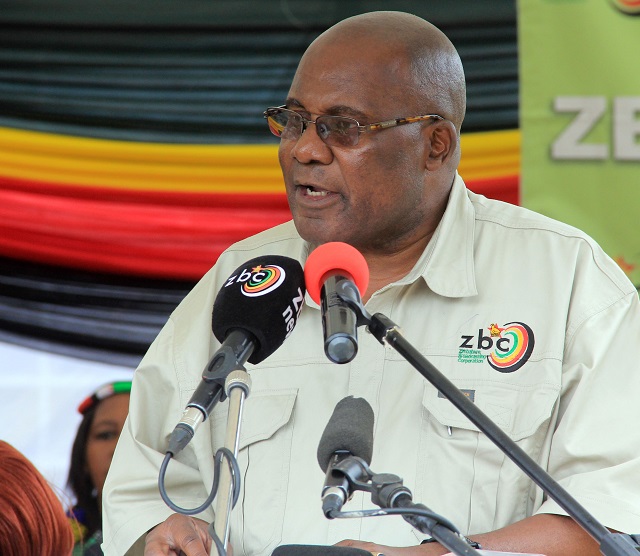Minister Mushohwe launches ZBC news bulletins in nine languages


The Minister of Information, Media and Broadcasting Services Dr Chris Mushohwe delivers a speech during the launch of the news bulletins at ZBC Montrose Studios in Bulawayo yesterday
Mashudu Netsianda, Senior Reporter
THE Minister of Information, Media and Broadcasting Services Dr Chris Mushohwe yesterday officially launched the Zimbabwe Broadcasting Corporation (ZBC) television news bulletins for nine languages.
Speaking during a colourful ceremony at ZBC’s Montrose Studios in Bulawayo, Dr Mushohwe said the introduction of the formerly marginalised languages to national television underlined the Government’s commitment to ensure that all national languages were accorded due respect and recognition in line with the constitution.
“We are here for the launch of television news bulletins in nine national languages that were formerly marginalised. In fact, with this occasion we are giving such languages the respect they deserve as Zimbabwean languages as well as fulfilling the dictates of our constitution, which recognises 16 national languages,” he said.
Of the nine languages, four were introduced on television in 2016 while five were brought in yesterday.
The languages that were introduced yesterday in the ZBC television news bulletins are Chewa, Ndau, Kalanga, Xhosa and Shangaan. Venda, Nambya, Sotho and Tonga news bulletins were introduced in September last year.
Previously, the public broadcaster’s news bulletins were only done in English, Shona, Ndebele and Sign Language.
Dr Mushohwe said the remaining languages Chibarwe, Tswana and Khoisan will soon be included in news bulletins.
“We also want to see current affairs programmes, dramas, comedies and much more in the languages of the bulletins that we have launched today,” he said.
Dr Mushohwe said language is an important element of a people’s culture. He urged Zimbabweans to be proud of their languages and diversified culture.
“By introducing on television news bulletins in languages that were previously not broadcast, as a national broadcaster, ZBC is promoting the cultures associated with these languages. In other words, the introduction of these languages is synonymous with the introduction or exposure of cultures associated with the languages to the nation,” said the Minister.
“Therefore with the introduction of each news bulletin on television, the nation is indeed celebrating the diversity of the Zimbabwe cultures.”
The Minister said despite cultural diversity, there was a need for all Zimbabweans to remain united and protect the country’s sovereignty against neo-colonialists, hunger and corruption which are a threat to the nation.
He said ZBC and other private players in the media industry, should play a leading role of uniting the people of Zimbabwe through promoting their cultures and safeguarding the country’s integrity in their programming.
“Our independence and sovereignty, the peace that we have and the unity brought by our fathers, President Mugabe and the late Vice-President Umdala Wethu Dr Joshua Nkomo should never be taken for granted,” said Dr Mushohwe.
ZBC acting chief executive officer Mr Patrick Mavhura said the public broadcaster places high value on local languages by taking a giant step in correcting an anomaly which existed for years.
He said the introduction of television news bulletins in local languages was being done in phases.
“We carried out auditions, which were overwhelmingly responded to, and that got us where we are today. We are getting into another phase where the news and current affairs team will be bringing current affairs programmes in some of these languages. We are also working on dramas and other entertainment programmes,” he said.
The launch was held under the theme, “Celebrating cultural diversity through broadcasting.”
Yesterday’s event was attended by the Deputy Minister of Information, Media and Broadcasting Services, Cde Thokozile Mathuthu, chiefs, officials from the Broadcasting Authority of Zimbabwe, Transmedia Corporation, National Arts Council of Zimbabwe as well as independent content producers.
@mashnets.
*See Page 5 for material that highlights how 19th century imperialists sought to impose their culture and language so they could advance their hegemonic interests in Africa and Asia.











Comments